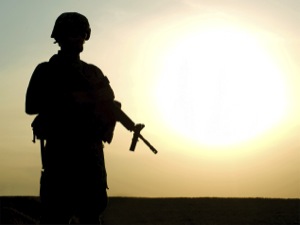
I served in the U.S. Navy between 1980 and 2000, and am now a military retiree. At fourteen I figured out I was a transsexual, but I talked myself into believing I was just a crossdresser – so even though I knew I was trans when I entered the service, I didn’t identify myself then as a transsexual.
By 1996 – four years before I was eligible to retire from the Navy – I knew that I was more than a crossdresser, but I still wasn’t ready to identify myself as a transsexual. During the last two of those four years, between 1996 and 2000, I was sexually harassed by the combined efforts of a subordinate and my ship’s executive officer. I still have the documentation where the Navy, in an inquiry, found that I was the victim of sexual harassment by male servicemembers because I was presumed to be gay.
I knowingly sacrificed my trans identity for the entire 20-years I was in the military; I knowingly sacrificed my need to address my gender identity concerns for the last four years of my service. Sacrificing my identity was really an unsustainable pursuit, as my sexual harassment experience showed me, and I’m absolutely amazed I made it through 20-years of service to retire.
OutServe Magazine has recently documented a portion of the personal stories of active duty trans people in the January/February issue in an article entitled, The New DADT: The Military’s Ban on Transgender Service. The author of the article, Katie Miller, indicated OutServe had 44 trans people signed up for their chapters.
There is an effort in its infancy to have trans people be able to serve openly. With that in mind, LGBT organizations should perhaps consider engaging in similar tactics for the repeal of DADT toward open service for trans people, and a first step might be a collection of stories by trans veterans with an emphasis on stories of those who’ve been discharged, or nearly discharged, for being trans.
We have open service for LGB servicemembers now, although we don’t have an equality of benefits for LGB couples with at least one servicemember
The amount of resources that a project to document the stories of the courage of transgender veterans would require would likely seem to be relatively small and such a project could be an important first step toward open trans military service. I believe the time for a project like this has come.











I am also a military (USAF) retiree and waited until years after retirement to accept my gender identity and begin my transition. Hopefully we will gain equality someday. We are real people and can do all the things that cis gendered people can do, including being worthy of the public’s trust (holding a security clearance).
I’m an active duty member of the Air Force and am struggling with my gender identity. I feel like I’m somewhere in between a crossdresser and a transsexual. It’s very confusing at times and it sure wold be nice if the military took a better look at helping people like me. Going to work and having to hide who you are is stressful enough, but having to do it in the military can be unbearable at times.
I am a veteran of twenty two years service, four in the USN, the rest in the USAF, retiring as a Master Sgt/E7. I was forced/allowed to retire in 1985 because I was in a desperate mental state and made the mistake of mentioning my desire to change gender to an AF therapist. This led to my security clearance being pulled.
I am looking forward to the day when transsexual service members can live openly without discrimination. That’s not likely to happen in the near future but it is a goal to work toward.
Military retirement in 1985 was all it took for me to begin transition with the defining surgery in December 1987.
Forcing trans people out serves no purpose other than keeping cisgender people happy. If they are not faced with something out of the ordinary they don’t have to think about it. Making them think about it takes effort.
No one is insulting you. It sounds like you were unable to suppress your gender identity from a very early age. Many people do, some into their 60’s even. That’s just the way things are sometimes.